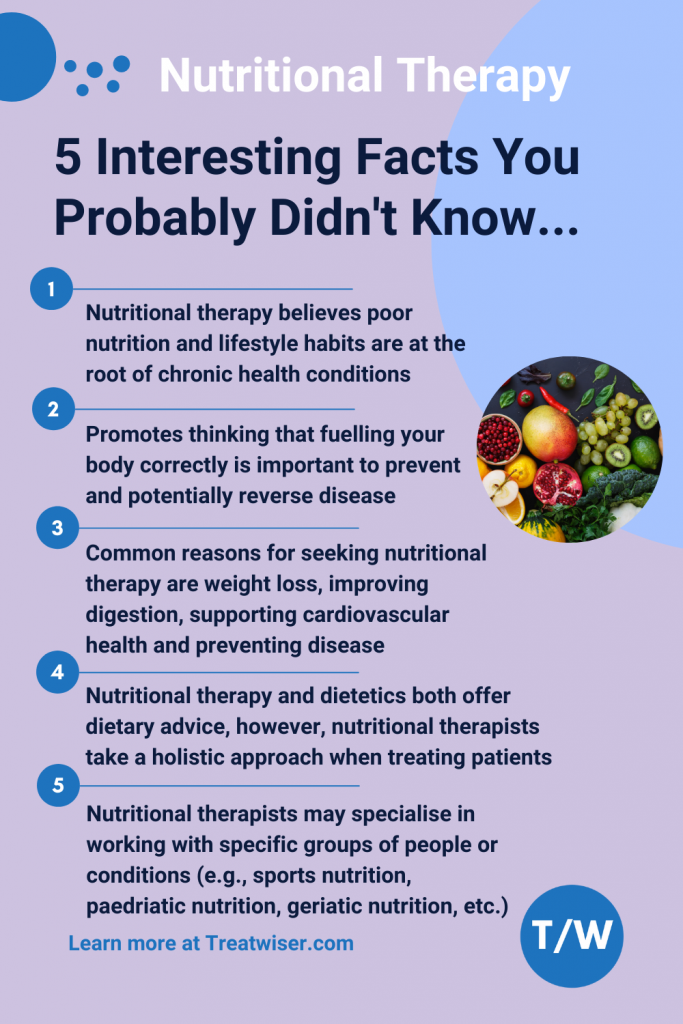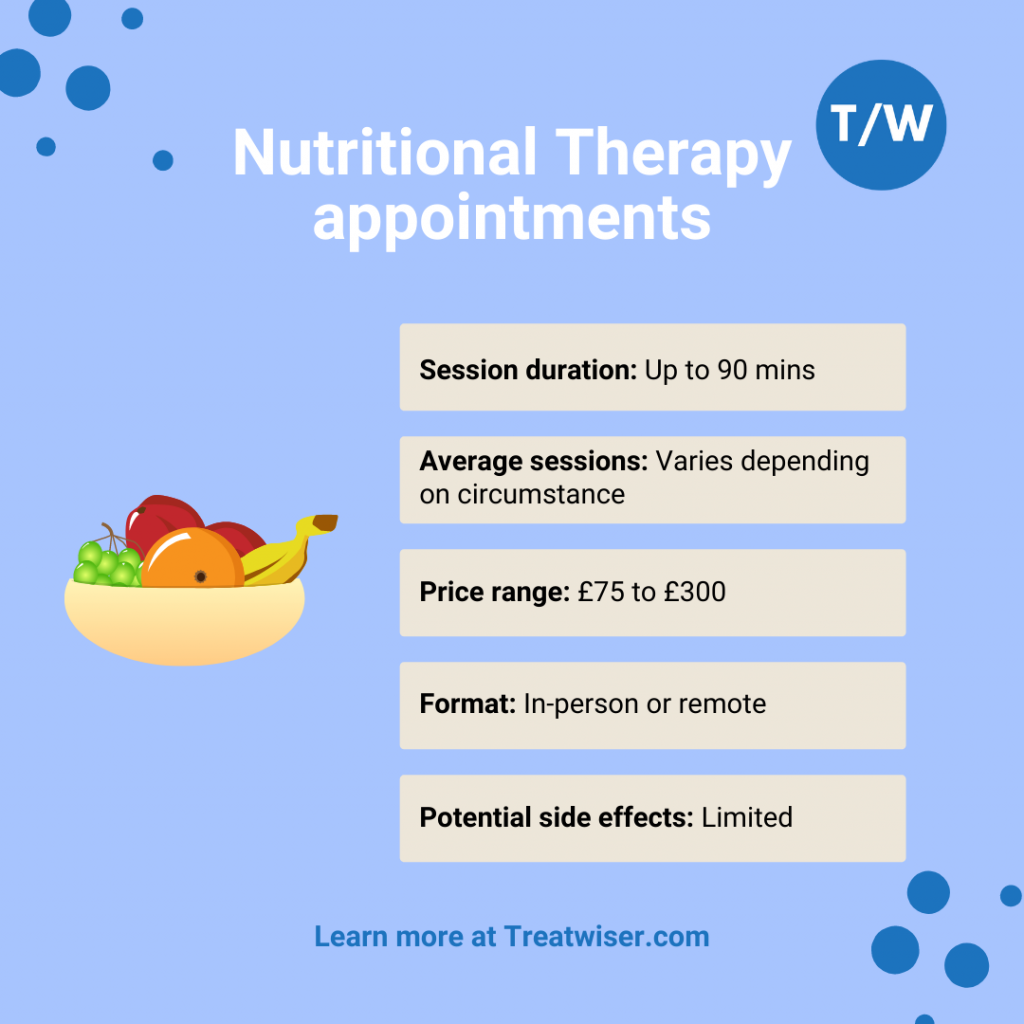What you eat plays a significant role in how you feel, look, and perform. If you need help with your diet and lifestyle, a trained nutritional therapist can offer guidance.
In this article, we’ll explore nutritional therapy and how it can improve your life. By the end of this guide, you’ll know if this therapy is right for you!
Table of contents
- 5 interesting facts about nutritional therapy
- What is nutritional therapy?
- What is the theory behind nutritional therapy?
- When and how is nutritional therapy used?
- What is the evidence to support nutritional therapy?
- What can I expect as a nutritional therapy patient?
5 interesting facts about nutritional therapy

What is nutritional therapy?
Nutritional therapy is a healing system that uses dietary changes, nutritional supplements, and lifestyle changes to support vibrant health. Nutritional therapists apply nutrition science to help clients achieve their health goals (1).
In addition to taking a comprehensive health and diet history, nutrition therapists use tools to investigate the root cause of symptoms. This involves identifying nutrient deficiencies, hormonal imbalances, allergies, and chronic infections with functional laboratory testing.
What is the theory behind nutritional therapy?
Nutritional therapy believes poor nutrition and lifestyle habits are at the root of chronic health conditions. Unhealthy habits can make your body’s detoxification pathways inefficient, slow your digestion, increase oxidative damage, trigger inflammation, and more.
With the help of therapy, you can prevent and reverse disease by fuelling your body correctly. Good nutrition promotes optimal detoxification, digestive function, immunity, heart health, hormonal balance, and more.
When and how is nutritional therapy used?
As a holistic healthcare practice, nutritional therapy is suitable for people of all ages and backgrounds. It’s typically conducted one-on-one. However, practitioners may also offer group consultations, give community talks, or work in a clinic.
Nutritional therapy is not “one size fits all.” The advice is tailored to each person’s unique circumstances and physiology.
Therapists monitor your progress with follow-up visits and ongoing support. They also advise you on meal planning, cooking tips, recipes, and healthy shopping lists.
Nutritional therapy is used in a range of situations
Some of the common reasons people seek nutritional therapy are weight loss, improving digestion, supporting cardiovascular health, and preventing disease. However, nutritional therapists work with a wide range of people to resolve different symptoms.
Patients commonly seek out nutritional therapy for the following reasons, however more research is required to support its efficacy, and you should always speak to your GP or qualified medical practitioner before booking any appointments:
- Autoimmune disease
- Inflammatory bowel disease
- Irritable bowel syndrome and other gut issues
- Poor detoxification
- Liver disease
- Blood pressure
- High cholesterol levels
- Mood disorders
- Poor immunity
- Fibromyalgia and chronic fatigue syndrome
- Improve skin
- Insomnia
- Headaches
- Hormonal imbalances
- Women’s health
- Fertility
- Stress and burnout
- Food allergies and intolerances
You don’t have to have health problems to benefit from nutrition therapy. Nutritional therapists can help you enhance your current level of health.
Types of nutritional therapy
Nutritional therapists and food therapists may specialize in working with specific age groups or conditions.
- Sports nutrition helps athletes achieve their ideal body composition to perform at their best.
- Paediatric nutrition focuses on babies and children to help with weaning, picky eaters, behavioural problems, frequent infections, digestive symptoms, and allergies.
- Geriatric nutrition specialises in the elderly, helping to manage age-related diseases.
- Prenatal nutrition supports women during preconception, pregnancy, and postpartum.
What is the evidence to support nutritional therapy?
Research has shown that having nutritional counselling from a qualified practitioner is helpful – especially when working alongside a healthcare team. Nutritional therapy may reduce healthcare costs in the long term (2).
Evidence shows nutrition interventions may help to manage:
- Weight loss and fat loss (3)
- Cholesterol levels (3)
- Hypertension (4)
- Type-2 diabetes and poor blood sugar control (5)
- Gestational diabetes (6)
- Inflammatory bowel disease (7)
However, research is ongoing to support the use of nutritional therapy for a range of other health conditions.
What can I expect as a nutritional therapy patient?
The nutritional therapy consultation
Before your initial consultation, you’ll be asked to fill out a health questionnaire and write down a 3-day food diary.
In the first one-on-one appointment, you’ll talk to the nutritional therapist in person or via Zoom. The consultation lasts about 90 minutes, giving the therapist enough time to take an in-depth health and dietary history. They will discuss your symptoms, lifestyle habits, digestive health, and health goals.
You will then be given individualised nutritional advice, supplement recommendations, and suggested lifestyle changes. Your nutrition plan will include meal ideas and recipes. The aim is to make the lifestyle changes as sustainable as possible.
You may be sent for functional laboratory testing or be referred to another healthcare provider to investigate your symptoms. This helps the nutritional therapist build a detailed picture and design a tailored plan.

How do I find a nutritional therapist, and what qualifications should they have?
The term nutritional therapist isn’t legally protected in the UK. Unfortunately, this means anyone who gives nutrition advice may call themself a nutritional therapist.
We suggest finding someone who has completed a nutritional therapy course from a Nutritional Therapy Education Commission (NTEC) accredited university or institution. A qualified nutritional therapist must register with the Complementary and Natural Healthcare Council (CNHC) and the British Association for Nutritional Therapy (BANT). This ensures practitioners are trained, abide by a code of ethics, and engage in continued professional development.
Before booking an appointment, confirm your practitioner is registered with CNHC and BANT. You can search the register on their websites to find someone in your area.
You can also use Treatwiser’s directory to find a nutritional therapist near you. Use the search features to narrow your search by location, professional body membership status, and more
What is the difference between a nutritional therapist and a dietician?
Nutritional therapy and dietetics are similar professions – both offer dietary advice in the pursuit of health.
However, nutritional therapists take a holistic view when treating patients and work with a wide range of conditions. In therapy, each person is seen as unique with unique dietary needs.
Dietician is a protected title for those who have completed a BSc Honours degree in dietetics and a supervised internship in the NHS. Dietitians usually take a conventional or allopathic approach to treatment and frequently work in medical settings.
Wondering what the difference is between the work of a nutritional therapist and a naturopath or nutritionist? If the answer is yes, you may find this article useful.
How much will it cost?
Nutritional therapy is paid for privately as it isn’t available on the NHS. As an unregulated profession, consultation fees vary.
The first consultation may cost between £200-£300 for 1.5 hours. Follow up sessions may cost between £75-£150 for 30 minutes, 45 minutes, or 60 minutes. This typically includes email support.
Other expenses you may incur include fees for functional laboratory testing, nutritional supplements, and interpretation of lab results. Ask your nutritional therapist about their fees – and other costs – before booking an appointment.
How many appointments will I need?
The number of appointments you need depends on your circumstances and symptom severity.
Some people visit a nutritional therapist once or twice for general dietary advice. However, for most people, nutritional therapy is a long-term commitment. Follow up consultations happen every 4-6 weeks initially, where your nutrition plan is adjusted based on your progress.
The time between appointments increases as you progress and begin to feel better. You may require a follow-up every few months, reducing to bi-annual or annual appointments for support and accountability.
What are the major risks associated with nutritional therapy?
The risks associated with nutritional medicine are low, provided you work with a well-trained therapist.
However, therapy isn’t a replacement for medical advice. If you have a chronic health condition, speak to your doctor before starting therapy.
What do therapists say about nutritional therapy
Read some testimonials to hear what nutritional therapists are saying about their experiences including what to expect as a patient:
Resources and other nutritional therapy information
1. https://www.ncbi.nlm.nih.gov/pmc/articles/PMC2976542/
2. https://pubmed.ncbi.nlm.nih.gov/27448948/
3. https://pubmed.ncbi.nlm.nih.gov/18517106/
4. https://pubmed.ncbi.nlm.nih.gov/23981465/
5. https://nutritionj.biomedcentral.com/articles/10.1186/s12937-018-0351-0
6. https://pubmed.ncbi.nlm.nih.gov/17596470/
7. https://www.ncbi.nlm.nih.gov/pmc/articles/PMC4734995
DISCLAIMER: The Site cannot and does not contain medical / health advice. The medical / health information is provided for general informational and educational purposes only and is not a substitute for professional advice. Accordingly, before seeking any form of medical advice, diagnoses or treatment based upon such information, we encourage you to consult with your GP or other qualified health practitioner. You must never disregard professional medical advice or delay in seeking it because of something mentioned on this Site. The use or reliance of any information contained on the Site is solely at your own risk.





